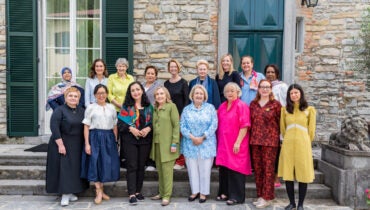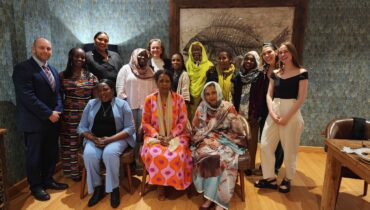A 2010 study found that United States military women were more likely to be raped by a fellow military member than killed by enemy fire in Iraq, and recent numbers suggest that the problem is ongoing. It is imperative that the US military address sexual assault within its own ranks—both for the safety of women in uniform and to encourage partner militaries to do the same.
The United States military is in a unique position to lead by example through its global reach and numerous operations with partner militaries–including those responsible for wartime atrocities. But, widespread sexual harassment and assault undermines the United States’ credibility and moral authority. We argue that preventing sexual assault within the United States military could lead militaries in partner countries to more consistently comply with international humanitarian law (IHL) and contribute to ending sexual violence in conflict.
Conflict-related sexual violence committed by state actors
Reports of widespread rape and sexual slavery by Daesh/ISIS have contributed to the misperception that only non-state actors perpetrate conflict-related sexual violence. However, in his 2020 annual report on conflict-related sexual violence, the United Nations Secretary-General (UN SG) identified 41 non-state actors as well as 11 actors–such as military and police forces– from six states as perpetrators. Other sources, such as the Sexual Violence in Armed Conflict data, suggest that these numbers are low estimates because the number of state militaries reported to perpetrate sexual violence has been higher over the last 30 years.
The United States military cooperates through military support and joint operation missions with militaries in four of the six states identified in the UN SG report of perpetrating sexual violence in conflict: Somalia, the Democratic Republic of the Congo, South Sudan, and the Sudan. This puts U.S. forces in a position to lead by example in complying with IHL and the Women, Peace and Security Act of 2017, which compels the Department of Defense to address conflict-related sexual violence.
Pervasive problem of sexual assault in US armed forces
Military sexual assault has long been a threat to the safety of US military personnel, and particularly to women. In the 2018 fiscal year, the Defense Department’s annual Report on Sexual Assault in the Military estimated that there were 20,500 instances of “unwanted sexual contact,” which represents a 38 percent increase from the numbers recorded in the 2016 survey. Despite spending hundreds of millions of dollars on education, training, and resources, progress remains slow.
As part of our research project supported by the Principality of Liechtenstein, we interviewed women who served in the US military. One of them, a graduate of the United States Military Academy West Point, told us that “every woman at West Point was sexually harassed.” Formal and informal socialization practices in the military, including sexualized hazing and sexual harassment, create a permissive environment and encourage sexual assault. When officers sexually harass and assault subordinates, they legitimize and further enforce these practices. Furthermore, it undermines formal socialization processes and policies intended to prevent sexual assault.
Sexual assault is about power, not sex. Military sexual assault and conflict-related sexual violence are rooted in notions of masculine domination of others. If members of the armed forces assault those they serve with, they are unlikely to behave better when they encounter civilians or opposing forces, where the power inequity is likely even greater. Scholarship on both military sexual assault and conflict-related sexual violence identify group norms and culture, discipline, and leadership as causes of both phenomena. As the US armed forces fail to prevent sexual assault in its own ranks and struggle with implementing the WPS Act, they are unlikely to influence its partners’ compliance with WPS, IHL, and specifically laws governing conflict-related sexual violence.
US influence on partner militaries
Through its security cooperation program, the US invests billions of dollars to develop “professional, accountable, and capable security forces” in partner countries. Building partner capacity is part of a strategy to reduce costly, direct US military involvement. US Special Operation Forces (USSOF) play an important role in this program. For example, in 2014 USSOF conducted 176 training events in more than 60 countries, training more than 15,000 foreign military service members.
Instilling military professionalism is a pillar of US efforts to build partner capacity. Knowledge and practice of the law of armed conflict and human rights law are professed cornerstones of US military professionalism. As part of these efforts, training forces are responsible for modeling professional conduct, adherence to law of armed conflict, and IHL.
For better or worse, US forces, and particularly USSOF, often set the tone when cooperating with partner militaries. USSOF play an outsized role in US military strategy because of their prominence in joint operations and building partner capacity efforts. Their central role makes them influential actors on multiple fronts, including setting examples of behavior. What USSOF do, partner militaries try to emulate. That is why it is particularly harmful when they perpetrate sexual assault against fellow service members, because it normalizes sexual violence, and when unchecked, creates a culture of impunity for these crimes. Such a culture of impunity can create the conditions for unacceptable behavior to escalate into violations of human rights law and war crimes.
A tragic example of sexual violence committed by a US partner is the abuse of young boys by Afghan officers. Afghan troops have been trained by the United States through the NATO Training Mission – Afghanistan (NTM-A) since 2009. While the Leahy Amendment mandates the US to cut off aid in the case of gross human rights violations, a loophole for the Afghan Security Forces was used to avoid this outcome. Further, US forces were under no legal obligation to intervene and often faced retribution for reporting these cases, highlighting flaws in US – NATO training.
Sexual assault within US military ranks also undermines the United States’ credibility and moral authority. It is difficult to demand partner militaries to respect the WPS agenda, compliance with IHL, and accountability for conflict-related sexual violence, when US forces have a culture of impunity regarding sexual assault in its own ranks.
Moving forward
If the US wants to end sexual violence perpetrated by state militaries it cooperates with, such as Somalia, the Democratic Republic of the Congo, South Sudan, and the Sudan, then the US military needs to start at home. This involves addressing both informal and formal socialization, both of which can be partially confronted through reform of the military justice system.
Recent remarks from top Defense Department officials show increasing openness to significant reform, such as removing prosecutorial decisions on sexual assault from the military chain of command. This move is part of the Military Justice Improvement Act, which was originally introduced by Senator Kirsten Gillibrand in 2013, but has recently gained traction. Adopting this legislation would be a key step in eliminating impunity for sexual assault. Still, reforms and legislation must also be accompanied by a sustained commitment to dismantling toxic cultures in the military in order to facilitate meaningful change. If successful, this transformation could ensure that survivors are heard, that women in uniform are safer, and that our military partners around the world follow the US lead in living up to their professed values.
Dr. Robert Nagel is a postdoctoral research fellow at the Georgetown Institute for Women, Peace and Security. Julia Maenza (COL ’22) is a research assistant with Dr. Nagel.


